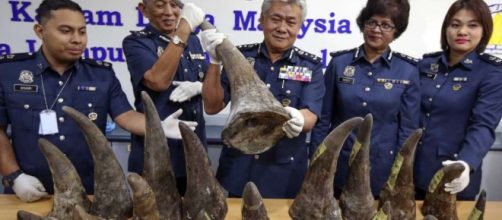Custom officials in malaysia seized an Illegal shipment of rhinoceros horns that originated in Mozambique via Doha Qatar. The 18 rhino horns are said to be worth $3.1 Million and were discovered by officials at the Kuala Lumpur International Airport. More than 112 lb (51kg) of horns were found packed in a wooden crate in a cargo warehouse after a tip off. False documents were used, the addresses were non-existent and they were declared as art objects. Rhinoceros are on the endangered species list but are continually being poached to feed a need for traditional remedies.
A major hub for endangered species
Malaysia is a major hub, transit point and destination for a variety of endangered species making their way to different Asian countries. In January, 1,860 lb (846 kg) of ivory tusks came through the Kuala lumpur airport and were seized. Two other well-known transit hubs are the Philippines and Vietnam. The parts of endangered species make their way to Asian markets; the biggest of which are China and Thailand. Just last month rhino horns worth $5 million were seized in Thailand.
Rhinos killed for their horns
Even though the UN Convention has banned global trade in rhinoceros horns, they are still killed to support the illegal trade. According to a WWF report, over 1,000 Rhinos were killed in South Africa in 2016 alone, representing a 6% loss.
Their horns are prized as an essential ingredient in traditional medicine and it is believed to treat a myriad of conditions and diseases including a hangover. Demand for the medicinal value of the horns continue to rise and is fueling poaching activities in Africa and Asia.
The illegal trade in endangered species
A decade ago, conservationists estimate there were half a million rhinos. Today only about 30,000 remain in the world. The five remaining species are considered "threatened" and three of the five are "critically endangered" A rise in the illegal wildlife trade is threatening the progress made in conservation to date.
The WWF believes that criminal syndicates are driving the illegal poaching through organized channels linked to killing fields in countries like South Africa.
A network of smuggling channels and transit points facilitate the illegal movement of the endangered cargo to its destination in Asian countries. The trafficking in wildlife and their parts can seriously threaten the survival of many wildlife species like the rhinoceros.

